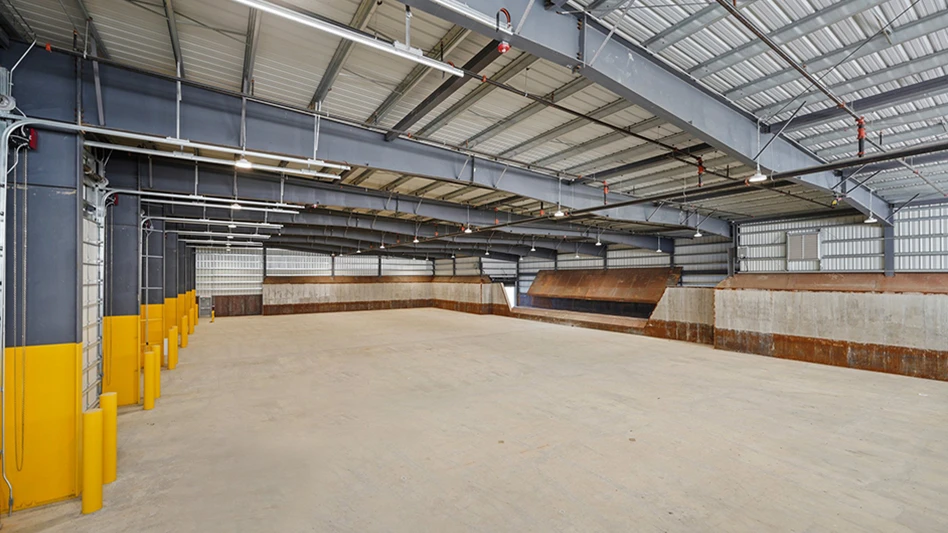
DSNY announces pair of initiatives to better manage waste in NYC
The New York City Department of Sanitation (DSNY) announced two new initiatives March 12 to better manage the waste created by city residents and businesses. New York City is denser than any other American city and lacks alleyways common in other locations. Because of this, New Yorkers for more than a century have placed their waste out for collection on the city sidewalks. DSNY’s new initiatives will seek to promote alternative strategies for setting out and managing waste for collection, opening up sidewalks for other uses.
First, DSNY published a proposed rule in the City Record that would require all new apartment buildings with 300 or more units to utilize containerized collection for their waste and submit a waste management plan to be approved by the Department of Sanitation. Many residential building developers do not adequately plan for the volumes of waste their future residents will generate, DSNY says, which results in large piles of bags left curbside on narrow sidewalks. This leaves waste accessible to rodents and other pests. Containerization requires waste to be kept in large containers, which are collected by specialized sanitation trucks, not put in bags on the sidewalk requiring collection by hand. Covered buildings that do not comply with this requirement will not be eligible for sanitation collection services. The rule will also cover any commercial-to-residential conversion with more than 300 units.
“City pedestrians navigate around piles of trash and recycling that take up significant sidewalk space,” DSNY Sanitation Commissioner Kathryn Garcia says. “It is time to make smarter, more efficient choices when it comes to the way New Yorkers set out refuse and recycling for collection in the public right of way. Today’s announcement is the first step in that direction.”
In another effort to make garbage and recycling set-outs cleaner and more efficient, the Department of Sanitation and the Department of Transportation (DOT) are collaborating in a “Clean Curbs” pilot program for commercial waste. Through the pilot program, private entities, such as Business Improvement Districts (BIDs) can apply for the opportunity to have sealed, on-street containers for their trash and recycling storage, which will reduce their need to set out bags of recyclables and garbage for collection on city sidewalks.
The Clean Curbs pilot program was developed after reviewing responses to DSNY’s and DOT’s Request for Expressions of Interest (RFEI) on containerized waste, including designs from the NYC-based Center for Zero Waste Design and from Marvel Architects with Recycle Track Systems, in partnership with Sam Schwartz Engineering and HR&A Advisors. The RFEI, released last year, sought creative solutions that would reduce the volume of refuse and recycling set-outs on city sidewalks, increase waste diversion, reduce truck traffic and greenhouse gas emissions associated with waste collection, and improve the cleanliness of city streets and sidewalks.
"We welcome the Clean Curbs program which will make it much easier to pilot shared waste storage in the parking lane, one of the strategies within the Zero Waste Design Guidelines,” Clare Miflin, founder of the Center for Zero Waste Design, says. “We hope that this will be the beginning of a multi-stakeholder initiative to redesign our city for circular material flows at every scale—from takeout containers to curbs to buildings to district scale infrastructure.”
“New York’s density, our lack of back alleys and the demands on our streetscape creates unique challenges. But we are looking to turn these challenges into an opportunity to make New York a global leader in waste reduction and material recovery,” Guido Hartray of Marvel Architects says.
While final designs of the Clean Curbs containers will be based on an applicant’s location and specific waste management needs, the entity will be required to sign a maintenance agreement with DSNY to ensure the area is kept clean and deiced for snow. The containers must meet strict requirements and specifications, such as being fully enclosed, rodent-proof, and compatible with carter operations and commercial regulations.
Applications for the Clean Curbs pilot program will be accepted beginning this spring and must be approved by the DSNY and DOT.
Get curated news on YOUR industry.
Enter your email to receive our newsletters.
Explore the April 2020 Issue
Check out more from this issue and find your next story to read.
Latest from Waste Today
- ReMA board to consider changes to residential dual-, single-stream MRF specifications
- Miller Environmental Group Inc. appoints CEO
- DPI acquires Concept Plastics Co.
- Laurel Mountain Capital announces investment in 5280 Waste Solutions
- Cielo investor requests annual meeting
- WIH Resource Group celebrates 20th anniversary
- NWRA: NIOSH cuts a step in the wrong direction
- Valicor Environmental services acquires Affordable Waste Management






